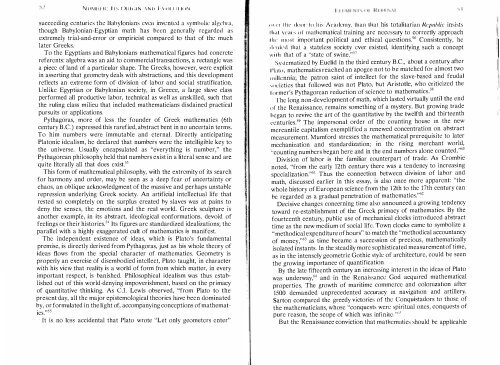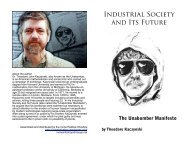CONTENTS - ouroboros ponderosa
CONTENTS - ouroboros ponderosa
CONTENTS - ouroboros ponderosa
Create successful ePaper yourself
Turn your PDF publications into a flip-book with our unique Google optimized e-Paper software.
Nllr\II\I Ie ITS ()J..:lt ilN ,\ NI) 1'.\ /J1 ( JIH )N<br />
succeeding centuries the Babylonians even invented a symb()lic algehra,<br />
though Babylonian-Egyptian math has been generally regarded as<br />
extremely trial-and-error or empiricist compared to that of the much<br />
later Greeks.<br />
To the Egyptians and Babylonians mathematical figures had concrete<br />
referents: algebra was an aid to commercial transactions, a rectangle was<br />
a piece of land of a particular shape. The Grecks, however, were explicit<br />
in asserting that geometry deals with abstractions, and this development<br />
reflects an extreme form of division of labor and social stratification.<br />
Unlike Egyptian or Babylonian society, in Greece, a large slave class<br />
performed all productive labor, technical as well as unskilled, such that<br />
the ruling class milieu that included mathematicians disdained practical<br />
pursuits or applications.<br />
Pythagoras, more of less the founder of Greek mathematics (6th<br />
century B.C . ) expressed this rarefied, abstract bent in no uncertain terms.<br />
To him numbers were immutable and eternal. Directly anticipating<br />
Platonic idealism, he declared that numbers were the intelligible key to<br />
the universe. Usually encapsulated as "everything is number," the<br />
Pythagorean philosophy held that numbers exist in a literal sense and arc<br />
quite literally all that does exist.']<br />
This form of mathematical philosophy, with the extremity of its search<br />
for harmony and order, may be seen as a deep fear of uncertainty or<br />
chaos, an oblique acknowledgment of the massive and perhaps unstablc<br />
repression underlying Greek society. An artificial intellectual life that<br />
rested so completely on the surplus created by slaves was at pains to<br />
deny the senses, the emotions and the real world. Greek sculpture is<br />
another example, in its abstract, ideological conformations, devoid of<br />
feelings or their histories." Its figures arc standardized idealizations; the<br />
parallel with a highly exaggerated cult of mathematics is manifest.<br />
The independent existence of ideas, which is Plato's fundamental<br />
premise, is directly derived from Pythagoras, just as his whole theory of<br />
ideas flows from the special character of mathematics. Geometry is<br />
properly an exercise of disembodied intellect, Plato taught, in character<br />
with his vicw that reality is a world of form Irom which matter, in every<br />
important respect, is banished. Philosophical idealism was thus estab<br />
lished out of this world-denying impoverishment, based on the primacy<br />
of quantitative thinking. As c.I. Lewis observed, "from Plato to the<br />
present day, all the major epistemological theories have been dominated<br />
by, or formulated in the light of, accompanying conceptions of mathemat<br />
icS."S5<br />
It is no less accidental that Plato wrote "Let only geometers enter"<br />
f ,<br />
11\1"1 jilt" dool j() Ili:-; AcadclIlY, titan that his totalitarian Ucpllhlic insists<br />
lli;11 \,C;lrs of mathematical training arc necessary to corrcctly approach<br />
III(' Illllst important political and ethical questions.56 Consistently, hc<br />
dClli,·d that a stateless society ever existed, identifying such a concept<br />
wilh that of a "state of swine.")7<br />
Systematized by Euclid in the third century B.C., about a century after<br />
I'lato, mathematics reached an apogee not to be matched for almost two<br />
IlIilknnia; the patron saint of intellect for the slave-based and feudal<br />
\ocieties that followed was not Plato, but Aristotle, who cnl1clzed the<br />
Immer's Pythagorean reduction of science to mathematics."<br />
The long non-development of math, which lasted vIrtually un111 the end<br />
01 the Renaissance, remains something of a mystery. But growmg trade<br />
hegan to revive the art of the quantitative by the twelfth and thirteenth<br />
centuries." The impersonal order of the eountmg house m the new<br />
mercantile capitalism exemplified a renewed concentration on abstract<br />
measurement. Mumford stresses the mathematical prerequisite to later<br />
mechanization and standardization; in the rising merchant world,<br />
.<br />
I d ,,60<br />
'·counting numbers began here and in the end numbers a one counte .<br />
.<br />
Division of labor is the familiar counterpart of trade. As CrombIe<br />
noted "from the early 12th century there was a tendency to increasing<br />
specilization."61 Thus the connection between division of labor and<br />
math, discussed earlier in this essay, is also once more apparent: "tbe<br />
whole history of European science from the 12th to the 17th century can<br />
be regarded as a gradual penetration of mathematics.""<br />
Decisive chanaes concerning time also announced a growmg tendency<br />
toward re-establishment of the Greek primacy of mathematics. By the<br />
fourteenth century, public use of mechanical clocks introduced ahstract<br />
time as the new medium of social life. Town clocks came to symbohze a<br />
"methodical expenditure of hours" to match the "methodical accountancy<br />
of moncy,"63 as time became a succession of precious, mathematI ally<br />
isolated instants. In the steadily more sophisticated measurement of I1me,<br />
as in the intensely geometric Gothic style of architecture, could he seen<br />
the growing importance of quantification.<br />
.<br />
. . .<br />
By the late fifteenth century an increasing interest m the Ideas of Plato<br />
was underway," and in the Renaissance God acqUlred mathemallcal<br />
properties. The growth of maritime commerce a d eololllzatlOn . after<br />
1500 demanded unprecedented accuracy m navlgallon and arllllery.<br />
Sarton compared the greedy victories of the Conquistadors to those of<br />
the mathematicians, whose "conquests were spiritual ones, conquests of<br />
pure reason, the scope of which was infinite. '·'"<br />
. .<br />
But the Renaissance conviction that mathemal1cs should be apphcahle






